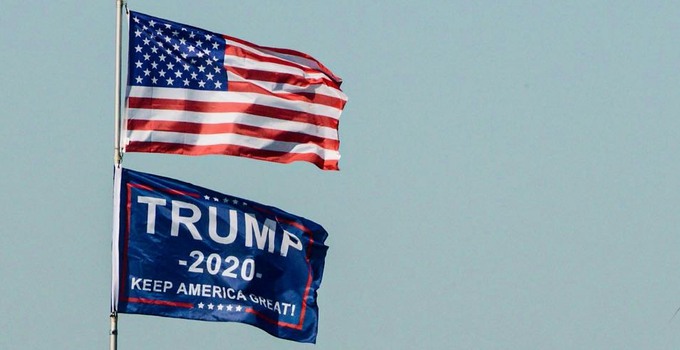
The new American right that has emerged over the last eight years represents a break from traditional American conservatism, argues Stefan Borg, Associate Professor of Political Science at the Swedish Defence University. Photo: Dalton Caraway/Unsplash.
"The new american right is a radical reassessment of conservative ideas"
In an article published in the scientific journal International Affairs , Stefan Borg analyses the new American right that has emerged in the United States over the past eight years.
"I believe it's important to understand the intellectual currents that have emerged. When Trump was elected president in 2016, it opened up a quite radical reassessment of conservative thought and what it means to be conservative in the USA today," says Stefan Borg, Associate Professor of Political Science at the Swedish Defence University.
In the article, he analyses the three leading currents within the new American right to gain a better understanding of what these ideas could mean for American foreign and security policy.
"Had Harris won the election, we could probably have guessed roughly what we would have seen in terms of American foreign and security policy. Now it is much more uncertain," he says.
The new right challenges traditional conservatism
American conservatism has traditionally stood on three legs: quite staunch market liberalism, social conservatism, and a relatively active foreign policy aimed at maintaining American global dominance.
"The new right is a settlement with this legacy. They are more sceptical of unfettered market liberalism and question the active foreign policy that they believe resulted in the prolonged wars, especially in Iraq but also in Afghanistan."
Impact in Trump's first presidency
The first group within the new right is sometimes called "the Claremonters", and gathers conservative intellectuals around the Claremont Institute in California. They are also referred to as "West Coast Straussians," since they are influenced by the political philosopher Leo Strauss (1899–1973) and one of his interpreters, the political philosopher Harry V. Jaffa (1918–2015).
This group has long claimed that the political establishment in the USA is corrupt and that it threatens the fundamental values of the American Constitution, which they hold in high regard.
"As for foreign and security policy, this faction has, at least since the 1990s, argued for restraint, which stands in stark contrast to the so-called East Coast Straussians, which include many neoconservative thinkers, such as Irving Kristol, Harvey Mansfield, and Paul Wolfowitz, Bill Kristol and Robert Kagan."
The new thing about "the Claremonters" is the impact they had on the broader conservative movement during Trump's first presidency. A well-known figure is Michael Anton, who worked with strategic communication in Trump's National Security Council.
Post-liberals far from Trump as a person
The second grouping within the new right are the so-called post-liberals.
"This is the most academic segment with leading figures such as Patrick Deneen, Professor of Political Science at Notre Dame, Adrian Vermeule, Professor at Harvard Law School, and the journalist and author Sohrab Ahmari. JD Vance has also called himself post-liberal," says Stefan Borg.
Post-liberalism is best understood as a Catholic-influenced movement where the central idea is that liberalism's singular focus on individual autonomy undermines communities that are necessary for both individual and societal well-being.
"This line of thought stands far from Trump as a person and considers that populism arises as a reaction to liberalism's failures."
Regarding foreign policy, the post-liberals argue that several American administrations have tried to impose on the world a liberalism that creates socially and ecologically unsustainable societies. "They also support foreign and security policy restraint."
Moreover, unlike other groups, the post-liberals believe that the USA should not view China as an adversary but rather in terms of a peer civilisation.
National conservative faction with political influence
"The third segment, the national conservatives, I would say has become the most significant in terms of potentially exerting influence on the upcoming Republican administration", says Stefan Borg.
They are a relatively broad coalition united in advocating nationalism, with political philosopher Yoram Hazony playing a leading role.
"He has, with some success, worked to create a sort of nationalist international that gathers nationalist politicians in the USA and Europe at regular conferences."
In this circle, you find people like Senator Josh Hawley, and also JD Vance. Kevin Roberts, president of the largest American think tank- the Heritage Foundation - and Elbridge Colby, one of the leading conservative security policy thinkers, are also part of this context.
Aggressive China policy and reduced support for Ukraine
"Regarding foreign and security policy, many in this group often combine an aggressive China policy with a great deal of scepticism towards American support for Ukraine", says Stefan Borg.
More traditional conservatives in Washington DC have even spoken of a "NatCon takeover" to describe how they have advanced their positions, partly by taking over the think tank Heritage Foundation, partly by creating a host of smaller organisations that work hard to develop a database of loyalists who can get jobs in the new administration that takes office in 2025.
"Trump's second administration will likely greatly accelerate the already started pivot to Asia and significantly cut support for Ukraine, or stop it altogether. They will also be less willing to enter areas outside of Asia and expect Europeans to take much greater responsibility for their own security", says Stefan Borg.
He believes that the new right's influence will likely be seen in rhetoric advocating security policy restraint combined with an aggressive China policy.
"The paradox in this approach might be that the USA, with such a policy, risks being drawn into a series of conflicts in Asia and could ultimately lead to anything but just restraint", he says.
Publication
Stefan Borg: A 'natcon takeover'? The New Right and the Future of American Foreign Policy, International Affairs 100: 5 (2024) 2233–2245.
More about
Page information
- Published:
- 2024-11-20
- Last updated:
- 2025-04-28
